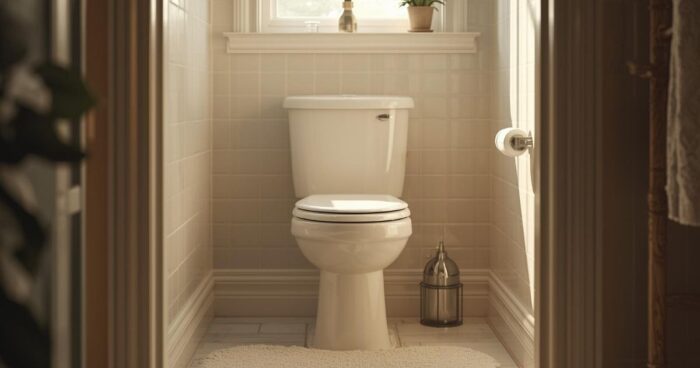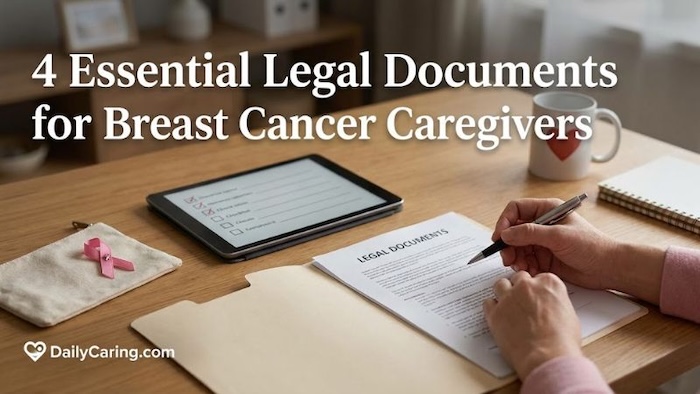While this can feel overwhelming for caregivers, practical strategies and compassionate approaches can help manage accidents with dignity and minimal stress.
Incontinence not only affects your loved one but can also feel exhausting for caregivers. These tips strike a balance between comfort, dignity, and practicality.
In this article, we’ll share seven expert-recommended tips to address incontinence in Alzheimer’s patients – from creating a bathroom routine to choosing the right products, so you can provide better care while preserving your loved one’s comfort and self-esteem.

Why Incontinence Happens in Alzheimer’s
As Alzheimer’s advances, the brain may no longer send clear signals that it’s time to use the bathroom. Mobility issues, difficulty recognizing the toilet, or simply forgetting where the bathroom is can also play a role.
Medications or other health conditions, like urinary tract infections or constipation, can make things worse.
The Emotional Side of Incontinence
Incontinence is not just a physical issue. It can cause embarrassment and frustration for your loved one and stress or exhaustion for caregivers. Acknowledging these feelings is important. Managing incontinence with patience and compassion helps preserve dignity on both sides.
When to Talk to a Doctor
Before assuming incontinence is only related to Alzheimer’s, talk with a healthcare provider. Issues such as urinary tract infections, prostate problems, medication side effects, or bowel concerns can contribute to accidents. A doctor can rule out treatable causes or suggest helpful products and routines.
Tips for Managing Alzheimer’s and Incontinence Don’t Have to Be Complicated
Many people with Alzheimer’s or dementia have incontinence. And that can make day-to-day life extra tricky.
To make life easier and more comfortable for your loved one, we want to share our top solutions to 7 common questions about managing Alzheimer’s and incontinence.
1. How to Talk about Incontinence Without Upsetting Your Loved One
The most important thing is to remain calm and understanding and not draw unnecessary attention to the issue.
For example, if they have an accident or leak, you could say something like:
- It looks like your pants are wet; sometimes that happens.
- It looks like you may have spilled something on your pants. Let’s get some clean clothes.
- An accident can happen to anyone.
2. What’s the Best Way to Introduce Incontinence Products?
Generally, it’s best to introduce a pull-up style adult diaper as padded or disposable underwear. The pull-up design feels like regular underwear.
It’s also best to avoid using the words “diaper” or “incontinence,” which can be confusing. Instead, use words like leaks or spills. And for diapers, say pull-up underwear or briefs.
The exception to this rule is if your older adult calls them diapers. If they’re using the term “diapers,” you should too. Take the cue from them. Otherwise, it can cause additional shame or embarrassment.
If you’re facing resistance, explain that the absorbent underwear protects if they don’t make it to the bathroom in time.
Sometimes, an older adult may not notice the difference between underwear and an absorbent pull-up style. If this is the case, you may not want to say anything at all and instead try replacing the regular underwear in their drawer with absorbent pull-on styles.
3. How Do I Choose the Best Incontinence Products?
Certain companies offer free samples of incontinence products, making it easy to find the size and absorbency that work best for your older adult.
Taking advantage of these samples saves money and will likely improve the product’s protection and comfort.
Some companies also offer the chance to speak with a kind, caring advocate who can provide expert recommendations on the best free sample for your older adult.
4. How Can I Help An Older Adult Get to the Bathroom Quickly Enough?
The path to the bathroom should be as short as possible and free of obstacles as much as possible to avoid nighttime falls.
Making it as easy as possible to find and use the toilet increases the chances that your older adult will avoid an accident, so lighting is essential!
Simple changes can make a big difference. For example, try leaving the bathroom door open, installing a light-up toilet seat, and creating a path to the bathroom with duct tape and/or nightlights.
Sometimes, you may also want to place a bed pad (underpads or Chux) in the bed if they sleep through the urge to go.
5. My Mom is Leaking at Night. What should I do?
Nighttime may be the most challenging time for an older adult to stay dry. The good news is that superabsorbent products exist.
MegaMax™ briefs by NorthShore™ are one of the most absorbent on the market. You can also place booster pads inside the absorbent underwear for extra coverage.
In addition, to minimize bedding changes, use a waterproof mattress protector under the sheets and layer absorbent washable or disposable bed pads (often referred to as underpads) over them.
It may seem overkill, but you won’t regret being overprepared if it means a better night’s sleep and less laundry in the morning.
In case of a leak, keep necessary products by the bed, such as wipes, skincare products, absorbent underwear, a change of clothes, and disposal bags. That way, you won’t have to search for them in the middle of the night.
6. What if Dad Won’t Keep His Absorbent Underwear On?
If an older adult is trying to take off their absorbent underwear, consider an adult bodysuit with snaps or waterproof underwear covers.
Both types of garments make it more challenging to remove absorbent briefs, and the underwear covers provide an added layer of leak protection.
Some absorbent briefs have stronger adhesive tape than others. To help keep the underwear in place, avoid buying briefs with hook-and-loop fasteners, which are easier to remove.
They may also try to remove the briefs because they’re wet and/or uncomfortable. It may help to sample different brands to see if they improve comfort and dryness.
7. What Should I Do if Dad Refuses to Change His Absorbent Underwear?
If your older adult consistently refuses to change their absorbent underwear, you could try a super-absorbent brief that provides all-day protection, or add booster pads for an extra layer of security.
In any case, protect their skin with a moisture barrier or rash cream to prevent irritation.
If you sense a bowel movement, encourage a trip to the restroom to determine whether a change is necessary.
Skin Care and Hygiene Basics
Prolonged exposure to moisture can cause rashes, irritation, or infection. Using barrier creams, gentle wipes, and breathable products helps protect skin. Washing with mild soap and patting dry, rather than rubbing, also reduces discomfort.
Creating a Supportive Home Environment
Simple changes at home make daily care easier. Keep a supply basket in the bedroom or bathroom with wipes, gloves, disposal bags, and extra underwear. Adaptive clothing, such as pants with elastic waistbands or Velcro fasteners, makes quick bathroom trips easier.
Building a Daily Routine
Scheduling bathroom breaks around meals, before bed, or before outings can reduce accidents. Linking toileting to regular activities helps reinforce the habit and provides predictability for your loved one.
When Professional Help May Be Needed
If incontinence becomes difficult to manage, or if skin breakdown, frequent infections, or resistance to care are ongoing, outside help may be useful. A geriatrician, urologist, occupational therapist, or in-home caregiver can provide new strategies or products.
Final Thoughts
Managing incontinence in Alzheimer’s is never easy, but it doesn’t have to take away your loved one’s dignity or your peace of mind. With the right products, routines, and support, you can make daily life more comfortable for both of you.
Remember, you’re not alone, and small adjustments can make a big difference in preserving comfort, reducing stress, and caring with compassion.
NorthShore™ sponsored this article. For more information, see How We Make Money.
Are you tired of nighttime changes? Our exclusive NorthShore™ brand of adult incontinence supplies provides a stronger alternative to store brands, with extra absorbency and coverage, and expert advice available seven days a week. Free samples are available upon request.
In business since 2002, NorthShore’s mission is to improve the quality of life of those with incontinence through caring, individualized service and discreet delivery of unique, life-changing products.
About the Author

Connie is the founder of DailyCaring.com and was a hands-on caregiver for her grandmother for 20 years. (Grandma made it to 101 years old!) She knows how challenging, overwhelming, and all-consuming caring for an older adult can be. She also understands the importance of support, especially in the form of practical solutions, valuable resources, and self-care tips.














Thanks for your response anyway. One of your earlier posts convinced me i am from now on best in diapers also daytime, without any second thoughts about worsening my wetting issues.
As i said earlier, doctor found no other fault to explain this weakness of bladder, except normal ageing.
Thank you for your nice reply. I do use a kind of liners, when risking to get into one of those “situations”. It’s just that when the “dam opens” there’s a flooding and they will be likely to leak. Since i now secured my night’s sleep by accepting and getting used to night diapers, i wonder if i should accept the same for daytime. I just hope I didn’t make the wrong decision to start with. It’s not that i have that much of a social life that i would need to bother about awkward situations.
You might want to experiment to see how wearing a brief in the daytime makes you feel. If you’re more comfortable, it sounds like it would be a good solution. You may also want to speak with your doctor to find out if there are any underlying health conditions that could be causing the incontinence and if there could be any lifestyle changes that could improve the situation.
Well, to start with i am “only” 69, and till now perhaps thinking of myself as too little aged to go for diapers 24/7. Neither did i think of myself as medically incontinent – instead my night wetting more or less self inflicted to not be exhausted by sleep deprivation. As i said this worked fine and i embraced my night diapers (BetterDry with doublers) as a way to regain wonderful sleep.
Of course i took this up with medicare, and there was no serious condition found, but the assumtion that this is about a weakening of bladder function due to normal ageing, which caused both the day “rushes” and the disturbed night’s sleep.
I do take your advice to try day diapers seriously and a good and well-meant one. Although guessing i will find it just as easy to adapt to them as i did with the night dittos, this will thus be my submitting to wearing 24/7, if i didn’t get your suggestion wrong.
I have an additional question about brands, but that can wait for a possibly continued communication.
It sounds like it might be best for you to discuss this with your doctor to see if there are any medical issues that could be contributing to the incontinence.
Unfortunately, we’re not able to recommend any specific brands of incontinence products.
To the Mrs who wondered where to take her husband for changes, i say that if it was my case, it would be natural that my wife – if i had one – would decide on that and go where she felt the most comfortable herself. I would just be grateful with whatever, and it would be nobody else’s business since this is a practical need.
Wonder if i did wrong the way i countered my frequent need to go to the bathroom night-time. It disturbed my sleep very much, since every time i went up to “take a leak”, i most of the time had so hard to get back to sleep that i lay awake till the morning hours. This made me almost never get a full night’s rest, my brain simply started rushing with thoughts however short i tried to make the bathroom trip.
This made me take the decision that i now almost regret. I tried to wear a night diaper, also securing the bed from leaks with a waterproof pad, and as soon as i woke with the need to go, i trained myself to let go while still half asleep, and then did succeed to fall back asleep. This has saved my nights and my sleep in an outstanding way. I wake fully rested nowadays.
The downside is i have gotten so used to this solution, i nowadays even seldom wake when it is time to go, so i wake in the mornings fully rested and only then discover my diaper is soaking wet. I guess this means i am stuck with the diapers night-time, even though there are occasions when i would very much like to not be dependent if them. Everything has a price…
Another thing that might be connected with this, is i for many years got an urgent need when approaching “safe places”, like home. This type of incontinence has a name, though I’m not sure if it is called stress incontinence. I had to seek the toilet really fast, to not have an accident. Nowadays it seems to be more rule than exception that i actually can’t make it in time, and i wonder if my more relaxed attitude towards night wetting has worsened this condition.
It’s great that you’ve given this so much thought and experimented until you found a solution that works. You could also look into wearing a disposable absorbent guard/liner so you won’t need to rush in situations when you’re approaching a “safe place.” Here are a few examples – http://shrsl.com/2tdz4
Thank you for your reply to my concern re using public restrooms with my husband. I have taken him with me a few times into the women’s restrooms & have not encountered any objections. However, I have not seen others do this, so I wondered if I was ‘out of line’. I appreciate your help!
You’re very welcome! We hope that our suggestions are helpful. It’s a challenging situation and has the potential to feel awkward, depending on the individuals you encounter in public. We’d like to think that most people would be kind and understanding of the situation.
Which public bathroom to use to assist a person with dementia? When in a public place with just men’s & women’s restrooms (no ‘family’ restroom), which one should I (a female) use to assist my husband (male)? As a new caregiver, I have not seen this issue addressed on websites.
This is a very personal decision and will depend on the situation, the location, and your own comfort level.
In general, it seems like it might work better to take your husband into the women’s restroom with you since you’re the person with full cognitive capabilities. People would more likely accept your husband in the women’s restroom because he is cognitively impaired.
However, if he needed to go urgently and there was a long line for the women’s restroom and you didn’t feel comfortable asking to jump to the head of the line, you might feel more comfortable going into a less crowded men’s restroom and announcing yourself and the situation before and as you enter. It truly depends on what you feel would work best in the moment.